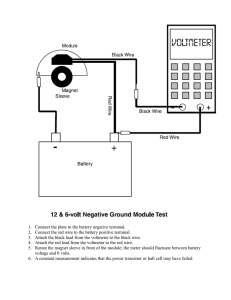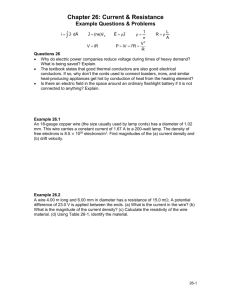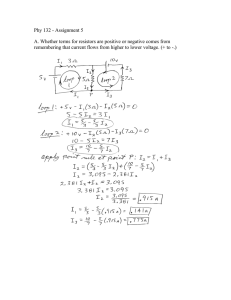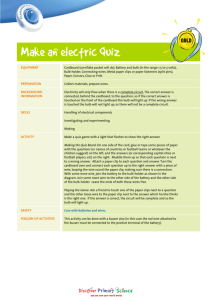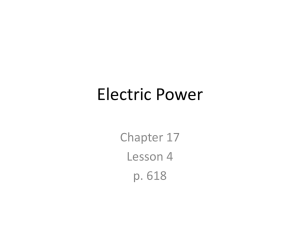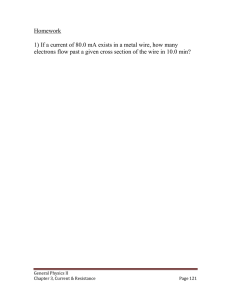1P22/1P92 Problems (2011) Chapter 22 Current and Resistance
advertisement
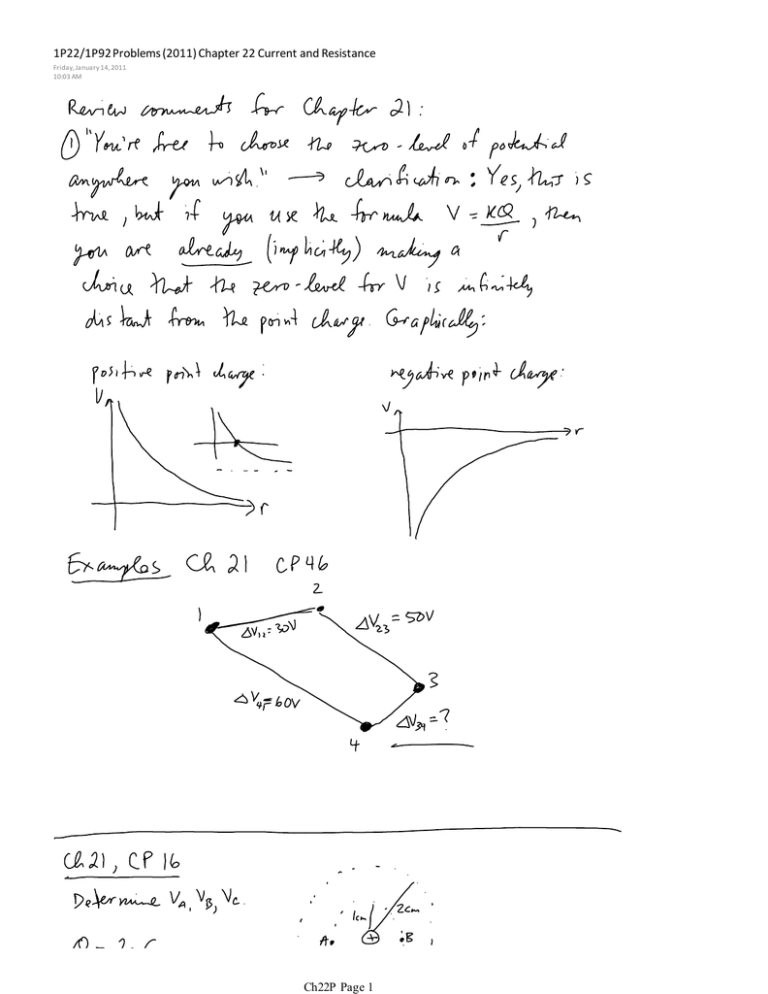
1P22/1P92 Problems (2011) Chapter 22 Current and Resistance Friday, January 14, 2011 10:03 AM Ch22P Page 1 Chapter 21, WP 17 An inflatable metal balloon of radius R is charged to a potential of 1000 V. After all batteries and wires are disconnected, the balloon is inflated to a new radius of 2R. (a) Does the potential of the balloon change after it is inflated? If so, by what factor? If not, why not? (b) Does the potential at a point a distance r = 4R change as the balloon is inflated? If so, by what factor? If not, why not? Ch22P Page 2 Ch22P Page 3 Ch22P Page 4 WP 8 A light bulb is connected to a battery with 1-mm-diameter wires. The bulb is glowing. (a) Draw arrows at points 1, 2, and 3 to show the direction of the electric field at those points. (The points are inside the wire.) (b) Rank in order, from largest to smallest, the currents I1, I2, and I3 at the points 1, 2, and 3. CQ 3 What causes electrons to move through a wire as a current? Ch22P Page 5 CQ 4 A light bulb is connected to a battery by two copper wires of equal lengths but different thicknesses. A thick wire connects one side of the light bulb to the positive terminal of the battery and a thin wire connects the other side of the bulb to the negative terminal. (a) Which wire carries a greater current? (b) If the two wires are switched, will the bulb get brighter, dimmer, or stay the same? Explain? CP 6 In a typical lightning strike, 2.5 C flows from cloud to ground in 0.20 ms. What is the current during the strike? CP 8 In an ionic solution, 5.0 × 1015 positive ions with charge +2e pass to the right each second while 6.0 × 1015 negative ions with charge e pass to the left. What are the magnitude and direction Ch22P Page 6 of current in the solution? CP 10 A car battery is rated at 90 A hr, meaning that it can supply a 90 A current for 1 hr before being completely discharged. If you leave your headlights on until the battery is completely dead, how much charge leaves the positive terminal of the battery? CQ 6 A wire carries 4 A of current. What is the current in a second wire that carries twice as much charge in half the time? Ch22P Page 7 CQ 11 The wires in the figure are all made of the same material; the length and radius of each wire is noted. Rank in order, from largest to smallest, the resistances of these wires. CQ 15 Rank in order, from largest to smallest, the currents through the four resistors in the figure. Ch22P Page 8 CQ 17 When lightning strikes the ground, it generates a large electric field along the surface of the ground directed toward the point of the strike. People near a lightning strike are often injured not by the lightning itself but by a large current that flows up one leg, through the body, and down the other due to this electric field. To minimize this possibility, you are advised to stand with your feet close together if you are trapped outside during a lightning storm. Explain why this is beneficial. CP 24 A motorcyclist is making an electric vest that, when connected to her motorcycle's 12 V batter, will warm her on cold rides. She is using 0.25 mm diameter copper wire, and she wants a current of 4 A in the wire. What length of wire must she use? Ch22P Page 9 CP 38 A 70 W electric blanket runs at 18 V. (a) What is the resistance of the wire in the blanket? (b) How much current does the wire carry? CP 41 The total charge a household battery can supply is given in units of mA hr. For example, a 9.0 V alkaline battery is rated at 450 mA hr, meaning that such a battery could supply a 1 mA current for 450 hr, a 2 mA current for 225 hr, etc. How much energy, in joules, is this battery capable of supplying? CP 43 A sculptor has asked you to help electroplate gold onto a brass statue. You know that the charge carriers in the ionic solution are monovalent (charge e) gold ions, and you've calculated that you must deposit 0.50 g of gold to reach the necessary thickness. How much current do you Ch22P Page 10 reach the necessary thickness. How much current do you need, in mA, to plate the statue in 3.0 hr? (atomic mass of gold = 197.0; Avogadro's number = 6.02 × 1023) CP 46 The hot dog cooker described in the chapter heats hot dogs by connecting them to 120 V household electricity. A typical hot dog has a mass of 60 g and a resistance of 150 Ω. How long will it take for the cooker to raise the temperature of the hot dog from 20°C to 80°C? The specific heat of a hot dog is approximately 2500 J/kg K. Ch22P Page 11 Ch22P Page 12
